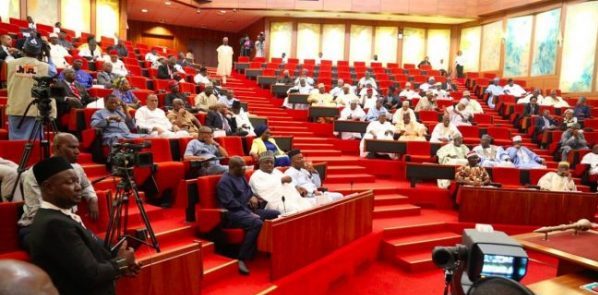News
Senate passes bill to limit tax incentives after FIRS loses $2.9 billion to waivers

A bill to amend the Federal Inland Revenue Service (FIRS) Act that regulates the processes of granting tax holidays to corporations operating in Nigeria has been passed for a second reading by the Senate on Tuesday.
Nigerian lawmakers are seeking to improve revenue generated by the Federal Government by limiting the number of tax holidays issued to companies after the FIRS recorded losses in trillions of naira to tax incentives.
Impact of tax incentives on Nigeria’s revenue
According to the FIRS in 2020, N1.3 trillion was lost to tax waivers in five years, and in October 2021, the tax agency reported losses amount to $2.9 billion yearly.
This has affected FG’s projected revenue, as actual income between 2018 and 2022 showed that projected revenue was N7.2 trillion in 2018, but N3.9 trillion was generated.
READ ALSO:Senate passes FCT 2022 budget of N607.9bn 31 days to end of year
Also, N4.12 trillion was realised a year after, falling short of the N7 trillion expected. In 2020, out of N5.4 trillion projected, N3.9 trillion was earned. Last year, N4.64 trillion was generated, falling short of the N6.4 trillion expected to receive.
Similarly, N3.66 trillion was recorded as revenue by the government in 2022, against the targeted revenue of N5.82 trillion.
Senate wants a say in tax incentive approval
Currently, only the Federal Government approves tax holidays to companies without legislative approval, the Senate wants this to change, and the lawmakers are planning to limit FG’s powers through the amendment bill.
The bill will mandate the FIRS, through the creation of section (9) in the FIRS Act, to obtain National Assembly approval before granting new or renewing corporate tax incentives and waivers.
According to Senator Yahaya Abdullahi, who sponsored the bill, “Such requests and applications for parliamentary approval shall stipulate clear conditions and justification for granting tax waivers and investment incentives.
“All, or any other enactments specific to cases of granting investment incentives and tax waivers to businesses, institutions and individuals that conflict with the provision of this Act, shall be deemed, not applicable.”
Abdullahi believes the bill will help shore up government revenue and reduce its dependence on loan, which has caused debt service to gulp over 90 per cent of the government’s revenues. In 2015, debt service was 32.7 per cent.
Join the conversation
Support Ripples Nigeria, hold up solutions journalism
Balanced, fearless journalism driven by data comes at huge financial costs.
As a media platform, we hold leadership accountable and will not trade the right to press freedom and free speech for a piece of cake.
If you like what we do, and are ready to uphold solutions journalism, kindly donate to the Ripples Nigeria cause.
Your support would help to ensure that citizens and institutions continue to have free access to credible and reliable information for societal development.






















